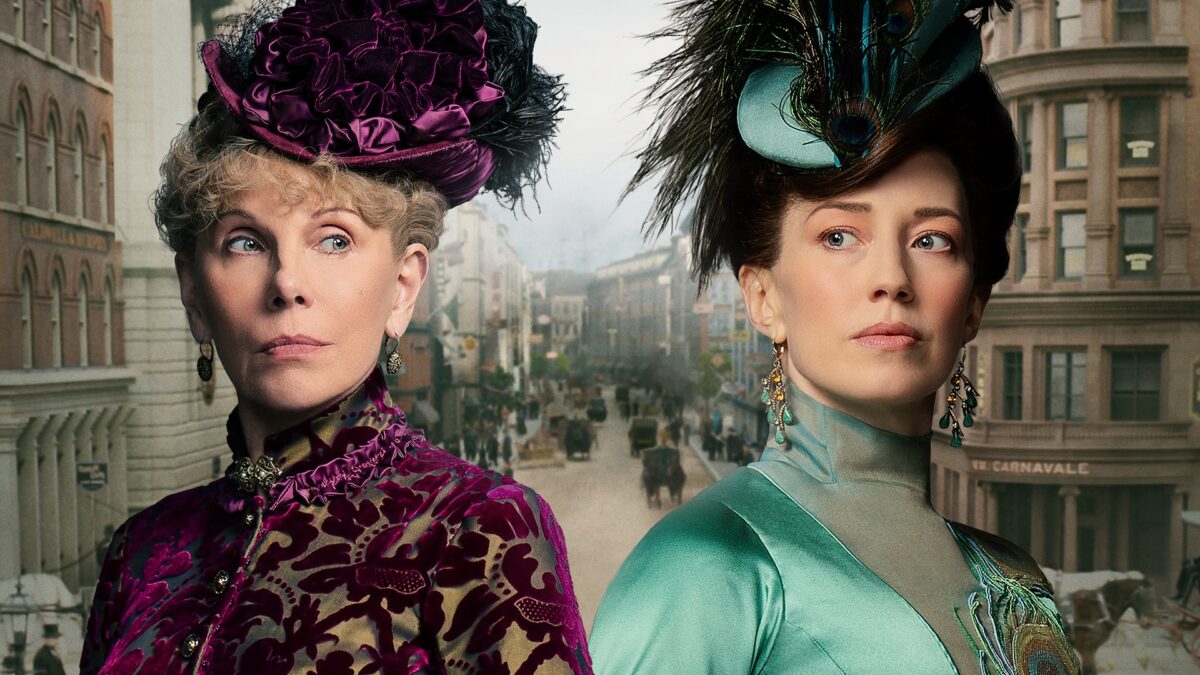by Bryan & Heather
HBO period pieces rarely disappoint, and while we might have been a year late to the game, we never really doubted that we would find our way to this newest prestige drama set in Victorian New York. We didn’t quite know what we’d find; reviews in general were solid, but would we be presented with a gritty piece of ‘dark history’ a la The Alienist and The Nick or more of a cutthroat boardroom drama in the vein of Succession? The answer, in fact, was neither. Instead, we were treated to a delightfully fun and witty high society melodrama filled with sumptuous period material–and yet one ultimately unsatisfying when it came to the deeper historical themes of its setting.
The Gilded Age follows the journey of young Miss Marian Brook, the daughter of a small-town Pennsylvania notable that, it turns out, was not quite as successful as he had led his daughter to believe. Left with no other option than to move in with her estranged aunts Agnes and Ada in New York City, Marian is quickly introduced to the thrilling and confusing social scene of the old money elite while her newfound friend Peggy Smith navigates a different sort of challenge–becoming a published author as a young black woman in the 1880s. Meanwhile, across the street, titan of industry George Russel and his wife Bertha move into their newly-finished mansion. While John deals with consolidating his business ventures, Bertha (played by the indomitable Carrie Coon) endeavors with single-minded determination to enter the elite social circles of the elite, all while those same elite attempt to keep such a gauche, new money woman out. All the while, the lives of these uber-rich families’ servants weave in and out, trying to make the best of what life has dealt them while influencing their employers’ in subtle ways –for good or ill.
If all this sounds vaguely reminiscent of Downton Abbey or other upstairs-downstairs social dramas, that’s a fairly accurate observation. At times The Gilded Age can feel downright soap opera-esque, albeit with a much cleverer script and truly delicious twists and turns. It’s material culture, too, is a cut above the rest. We’ve rarely seen better, whether through impeccable costuming, gorgeous sets, or even such attention to detail as older women clinging to the fashions of their youth rather than adopting new trends. While none of the main characters are themselves real, historical figures do make appearances, including the Astor family as the pinnacle of high society.
For all this surface-level accuracy, however, we couldn’t help feeling like The Gilded Age had fundamentally misunderstood the history it was attempting to relate. This can be seen most easily in its very title: “Gilded Age” was a satirical term coined by Mark Twain, pointing out that while the late 19th century had all the outward appearance of a Golden Age, the gold was only a thin layer of respectability over a much cheaper, grimy interior. Yet this show never digs past that gilding, concerning itself entirely with the gold leaf rather than the masses of exploited immigrants and laborers toiling in dark, unsafe factories and workshops that made all these elites’ playtime possible. Only a single scene takes place in anything that could be considered close to a tenement, and while Peggy does face discrimination due to the color of her skin, it is never more than servant intrigues or a cabby refusing her fare; she is never put in the mortal danger that faced so many black people during this period. The only possible crack in this golden facade is George Russel’s relationship with his wife, which often comes under strain when she values frivolity over matters of serious import like the possible failure of his trust and even his own imprisonment. Yet none of these business issues stem from labor unrest, the most serious incident being a lone train derailment in Pennsylvania.
In the end, then, The Gilded Age falls prey to similar deficiencies as Les Standiford’s study of Andrew Carnegie and Henry Clay Frick reviewed here on Concerning History. While the specific history it relates is certainly accurate, and well told to boot, its larger framework seems out of step with the twenty-first century. We both hope that its second season will continue to be just as entertaining–while making more of an effort to demonstrate that these people are more parasite than paragon. Given the viewpoints of its creators expressed in aftershow interviews, however, we won’t be holding our breaths.
